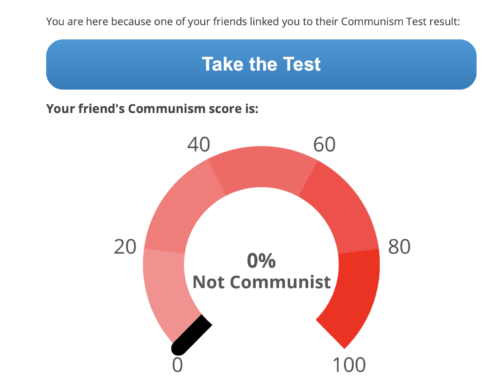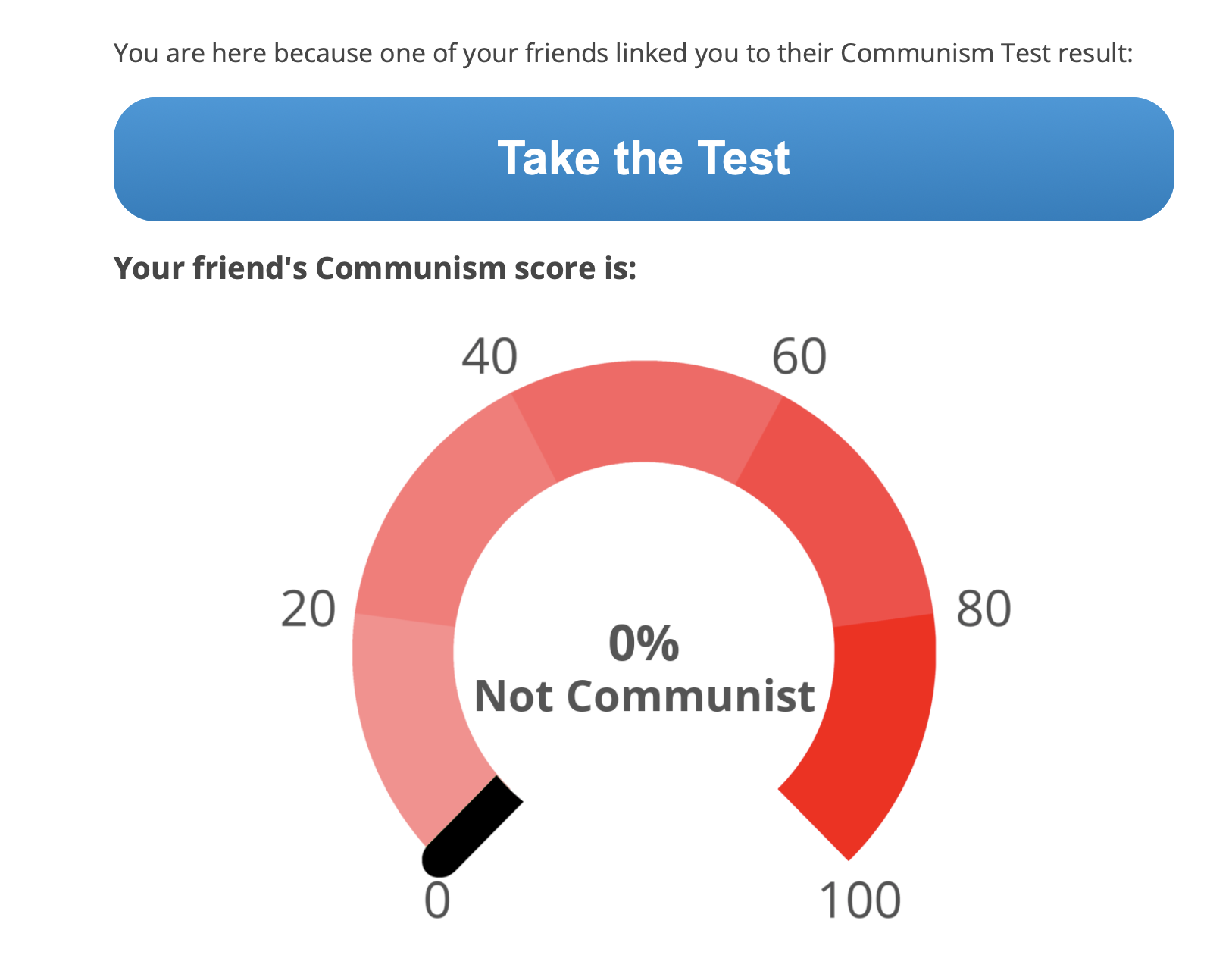
Dan Mitchell says:
I’ve shared lots of quizzes – some simple, some complex – that tell you whether you’re a libertarian.
I pass with flying colors, needless to say.
What about the other end of the philosophical spectrum? Is there a test that tells you whether you’re a communist?
To be snarky (and I do enjoy anti-communism humor), I could point out that this simply requires a low IQ, no knowledge of history, and a twisted soul.
But I’m biased.
So, in the interest of fair play and equal time, here’s a test that purports to tell you whether you’re actually a communist.
Want to take the Commie Quiz?: https://www.idrlabs.com/communism/test.php
Here’s the short description.
Communism is a social and political ideology whose ultimate goal is the establishment of a communist society, which is defined as a socioeconomic order based on common ownership and the absence of social classes, inequality, and private property. While Communism encompasses several of schools of thought, this test uses the classical Marxist texts and history as its foundations to determine whether you qualify as a Marxian communist.
By the way, I can’t resist commenting on the ludicrous assertion that communism is a “socioeconomic order based on…the absence of…inequality”.
That may be part of communist rhetoric, but communist regimes inevitably featurea gilded ruling class overseeing mass poverty for the other 99 percent.
But I’m digressing.
Let’s focus on the quiz, and I’ll simply note that not all of the questions have easy answers.
For instance, how should Question #8 be interpreted? There are plenty of nations in Europe that have very large governments, yet very high levels of political freedom. So is the correct answer to “disagree”?
But that requires us to decide what is meant by “absence of a free market economy.” Does this imply the technical meaning of socialism, involving government ownership, central planning, and price controls? If so, then world history suggests the correct answer is “agree.”
Or should one “partly agree” or “partly disagree,” meaning the choices closer to the middle?

I also have mixed views about the correct answer to Question #12.
I’d like to strongly disagree, but would that answer simply be a reflection of society as I’d like it to be?
In reality, some people do see themselves of members of groups.

The wording in Question #14 is rather sloppy.
For example, confiscatory tax rates on income over $250,000 obviously will cause some people to change their behavior.
But if tax rates are low for people making $65,000, there’s no reason why they wouldn’t work hard.
It would have been better if the question asked whether people “would work hard in countries where they cannot improve their living standards from their work.”

Last but not least, I’m also not sure how to interpret Question #15.
Who determines an “individual’s best interests”? For some people, that may mean stealing money from the elderly. If so, the answer is disagree.
But if we’re operating in a moral framework and asking whether the pursuit of self interest makes society better, the answer is agree.

I mention these caveats because I want a good excuse for the fact that I didn’t get a perfect score.
According to the quiz, the bad news is that I’m 6-percent commie.
Though the good news is that means I’m in the “Not Communist” grouping.

My bottom line is that I would be 0-percent commie (Like Kelly!) if the questions were designed properly!
P.S. Instead of bothering with the quiz, you can use two cows to determine whether you’re a communist.
P.P.S. If you prefer vapid analysis, read Teen Vogue.
Daniel J. Mitchell is a public policy economist in Washington. He’s been a Senior Fellow at the Cato Institute, a Senior Fellow at the Heritage Foundation, an economist for Senator Bob Packwood and the Senate Finance Committee, and a Director of Tax and Budget Policy at Citizens for a Sound Economy. His articles can be found in such publications as the Wall Street Journal, New York Times, Investor’s Business Daily, and Washington Times. Mitchell holds bachelor’s and master’s degrees in economics from the University of Georgia and a Ph.D. in economics from George Mason University. Original article can be viewed here.
Self-Reliance Central publishes a variety of perspectives. Nothing written here is to be construed as representing the views of SRC.



